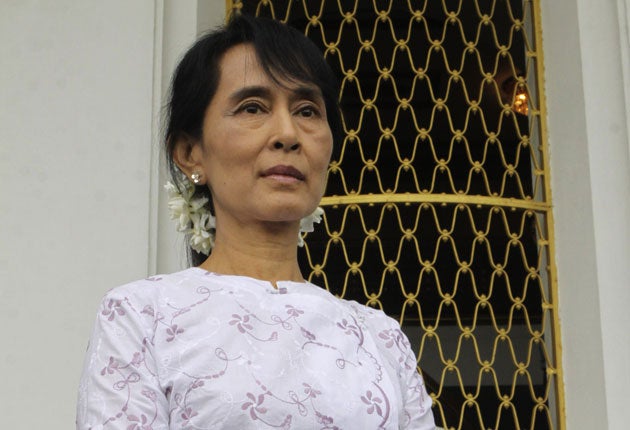Aung San Suu Kyi puts her newfound freedom to the test
The Burmese democracy leader today defies warnings to make her first political appearance outside Rangoon since her release

Your support helps us to tell the story
From reproductive rights to climate change to Big Tech, The Independent is on the ground when the story is developing. Whether it's investigating the financials of Elon Musk's pro-Trump PAC or producing our latest documentary, 'The A Word', which shines a light on the American women fighting for reproductive rights, we know how important it is to parse out the facts from the messaging.
At such a critical moment in US history, we need reporters on the ground. Your donation allows us to keep sending journalists to speak to both sides of the story.
The Independent is trusted by Americans across the entire political spectrum. And unlike many other quality news outlets, we choose not to lock Americans out of our reporting and analysis with paywalls. We believe quality journalism should be available to everyone, paid for by those who can afford it.
Your support makes all the difference.Aung San Suu Kyi will make her first political appearance outside Burma's main city, Rangoon, today since her release from seven years of house arrest, a journey that is going ahead despite a government warning it could trigger riots. The opposition leader's one-day trip to meet supporters in two towns to the north will test the limits of Ms Suu Kyi's freedom.
The last time she travelled to the countryside, in 2003, supporters of the country's now-disbanded military junta ambushed her entourage. Ms Suu Kyi escaped, but was detained and later placed under house arrest. She was released last November. A spokesman for the Nobel peace prize laureate, Nyan Win, said he expected today's trip to go smoothly. "We are not worried about security," Mr Win said. "We will provide our own security and authorities will also co-operate with us."
The brief trip will take Ms Suu Kyi about 50 miles north of Rangoon to the towns of Bago and Thanatpin, where she will meet party members and open two public libraries, Mr Win said. More trips will follow, but neither the dates nor the destinations have been decided upon. Win Htein, a leader of Ms Suu Kyi's party, said the trip was crucial because it "will test the reaction of the authorities and the response of the people". He added, "This trip will be a test for everything."
After half a century of army rule, the country organised elections late last year and officially handed power to a civilian administration in March. But critics say the new government, led by retired military figures, is a proxy for continued military rule and little has changed since.
Some 2,000 political prisoners remain behind bars, more than 100,000 refugees live in neighbouring countries, and sporadic clashes have erupted in the north-east between government troops and ethnic militias which have been fighting for greater autonomy for decades.
On Friday, however, Ms Suu Kyi held her second meeting with Burma's Labour and Social Welfare minister, Aung Kyi. The state-run New Light of Myanmar newspaper reported yesterday that the two sides agreed to co-operate on national stability and development. Also on Friday, the Information minister, Kyaw Hsan, urged Ms Suu Kyi to register her National League for Democracy (NLD) officially as a party, a step that would imply its acceptance of the government's legitimacy and allow it to take part legally in politics.
If Ms Suu Kyi's group reaches an accommodation with the government, it could serve as a reason for Western nations to lift political and economic embargoes on the country which have hindered development and pushed it into dependence on neighbouring China. What the Nobel laureate would expect in exchange for registering her party is unclear, though it could include the freedom of some of the country's 2,000 political prisoners.
The previous military government ordered the NLD's dissolution after it refused to register for last November's general election, describing the polls as unfair and undemocratic. The NLD contends its deregistration by the government was illegal, but a lawsuit seeking its reinstatement was dismissed. It nonetheless continues to carry out organised activities.
Ms Suu Kyi has travelled outside Rangoon since her release from house arrest, but not on publicised trips. Last month, she journeyed to the ancient city of Bagan with her son on a private pilgrimage. This nevertheless drew a large crowds of supporters and scores of undercover police and intelligence agents. Ms Suu Kyi made no speeches, and the trip ended without incident. In June, the government said it would not stop Ms Suu Kyi from travelling up-country to meet supporters, but warned her that the visits could trigger riots.
More than 30,000 people have been displaced by fighting in eastern Burma this year despite the army handing power over to a nominally civilian government, said activist groups.
Civilians who have been traumatised by atrocities by troops, including rape and mutilation, now face "a dire humanitarian crisis", according to the Shan Human Rights Foundation and the Shan Women's Action Network, organisations in Burma's Shan state. They report that many people fled into forests near their villages after skirmishes – which broke a 22-year ceasefire – began in March, only weeks before the new civilian-led administration took over after years of rule by the country's military junta.
Join our commenting forum
Join thought-provoking conversations, follow other Independent readers and see their replies
Comments